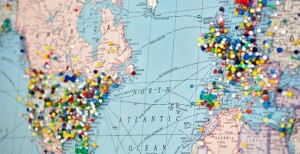This year, I had the privilege to travel to some fancy places where people live well. I live well now, but I didn’t grow up with money, and when you cross classes, when you weren’t born into the world you currently live in or the ones you occasionally visit, you feel that gulf more acutely. What people with money or born into money might take for granted is that money permits mobility. And sitting still sucks. Feeling left behind sucks. In high school, I was the only student in my French class who did not go on the bus trip to Quebec City because neither one of my divorced parents could afford to send me. There’s immobility for you—I literally sat at home while my classmates walked around Quebec, took in the sites, and practiced their French with very patient waiters at the city’s mid-level restaurants. In college, and during my twenties, there would be more financial troubles to come, including an expensive yearlong family court battle that would take a long time to dig out from. The household was too much of a mess to consider vacations or even weekend getaways. Travel—and really, experiencing the world in general—was not encouraged.
Which might explain why I couldn’t wait to get out on my own. (And how in a three-year period, we visited Quebec City—twice—and you should, too.)
Fast forward twenty-something years, and between March and May, I had a nine-week stretch where I went to four countries, one with my family and three on my own. This isn’t my norm any year. I visited Zurich, Switzerland; Positano, Italy; Exuma, the Bahamas, and Havana, Cuba. I came home wanting more. I am currently reading Elisabeth Eaves’ book “Wanderlust”, and early on, she references Thomas Jefferson warning his nephew that “Traveling makes men wiser, but less happy.” Jefferson seemed to be suggesting that travel triggers insatiability. After four countries in nine weeks, this feels painfully true. I’d like to say that I am enjoying a relaxing summer surrounded by the comforts of home, which I am, that I’m not in any rush, no planes, trains or buses to catch, but the reality is that on quiet, unstructured days, my mind drifts to where I’ve been and where I haven’t been. Sometimes I wonder if this is old wiring, of growing up in a household I didn’t want to be in, of not being able to afford things, and thinking about what to do and where to go next.
Unlike Ms. Eaves, I didn’t wander the world for years, and I applaud and envy those who do. I traveled in fits and spurts when I had some cash, often thinking “I didn’t yet go here” or “I haven’t yet tried that” but maybe my problem is that I’m still thinking like a 23-year-old. Maybe my 43-year-old self should just chill and say “Hey, look, at least you had the foresight to get up and see as much as possible whenever possible even while being discouraged to do so. Go you!” We need to learn to be kinder to our different selves. I am still learning this. I also need to recognize I won’t get to go everywhere, I won’t get to experience everything, but I have gone to many places and I have experienced many things, and there’s more to come. Did I backpack the world? No. Did I ever live without an address? No. But I’ve crossed socioeconomic classes and crossed oceans, and that’s more mobility than I ever could have predicted back when I was sitting at home, sixteen years old, waiting for my classmates to tell me how much they enjoyed Quebec. My daughter is twelve years old now, and, so far, has been to ten countries on four continents. She goes on class trips without issue. When she’s old enough, the world will be hers to backpack while I sit at home biting my nails, waiting for her emails and postcards. It sounds like such a simple middle class rite of passage, but to me, it will be a tremendous achievement.
